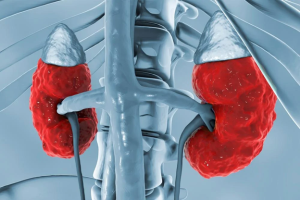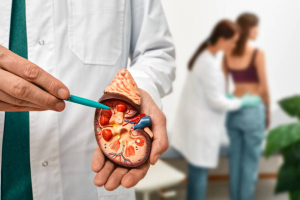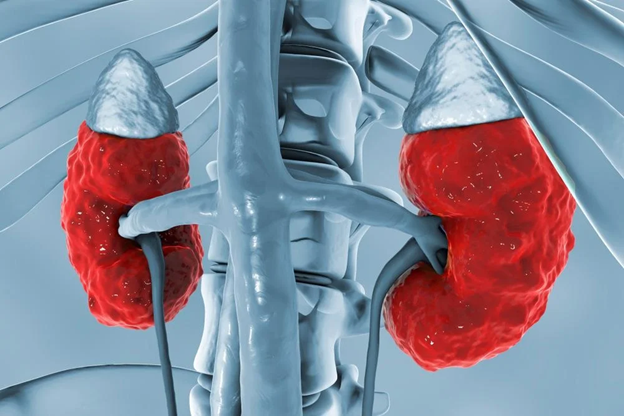Introduction
If you have been following social media trends, you will realize that in recent times the appeal for kidney transplants has become a rising concern, especially in Nigeria. People consistently flood social media platforms for themselves and family members affected to seek financial aid from strangers on the internet.

Source: Kateryna Kon/Shutterstock
The kidneys remain the most important organ for the excretion of waste and as such an injury to anyone can be debilitating. The kidneys play a huge role, and that is why we aim to educate you on risk factors and initial symptoms that can help you recognize if you are at risk of kidney disease or if you have kidney disease. These initial symptoms when identified can halt the progress and possibly reduce the need for kidney transplants among the populace.
What is Kidney Disease?
Kidney/renal diseases are disorders that affect the kidneys’ capacity to function normally. These diseases include glomerulonephritis, IgA nephropathy, acute kidney injury, traumatic kidney injury, renal cysts, and renal tumors to mention but a few, and in worse cases kidney failure due to chronic kidney disease (CKD).
Given the vital role kidneys play in filtering waste and excess fluids from the blood, kidney disease can significantly impact the overall health and well-being of an individual as damage to the kidneys makes it difficult for the kidneys to control blood pressure, balance electrolytes, and eliminate waste and extra fluid from circulation.
Who is at Risk of Kidney Disease?
Kidney diseases can affect humans independent of race, age, and general health, however, certain factors make you more susceptible to kidney diseases. Risk factors include:
- Family History: Your risk of kidney disease increases if you have a close relative who suffers from renal disease. Certain disorders are inherited that affect the kidneys independent of your lifestyle; an example is polycystic kidney disease (PKD) which can be inherited within a family.
- Age: With aging the kidneys as with every other organ begin to decline in their function, as the kidneys naturally work less well, especially after the age of 60. Reduced kidney function is more common in older persons, especially if they also have other underlying medical disorders like diabetes or hypertension.
- Drug abuse: Extended Usage of Specific Drugs: Overuse of over-the-counter analgesics such as aspirin, naproxen, or ibuprofen, especially in excess, can cause kidney damage if taken for an extended period.
- Hypertension, or elevated blood pressure: Hypertension is a major risk factor and cause of kidney diseases. In hypertension, renal blood vessels are destroyed, which makes it more difficult for the kidneys to adequately filter waste.
- Diabetes: The risk of kidney damage is increased by both Type 1 and Type 2 diabetes. The damage to the kidneys is called diabetic nephropathy. Diabetic nephropathy results from long-term damage to the kidneys’ small filtering units (nephrons) caused by high blood sugar levels.
- Obesity: Obesity increases the risk of kidney disease and also diabetes and hypertension which have been implicated as causative agents for kidney diseases.
- Smoking: Kidney disease is more common in smokers than in non-smokers. Smoking raises blood pressure and reduces blood flow to the kidneys, both of which harm kidney health.
Symptoms of Kidney Disease
Kidney disease typically doesn’t show symptoms until it has advanced, however, there are subtle indicators/ symptoms that raise the suspicion of an ongoing renal issue. Early detection of these symptoms can facilitate prompt diagnosis and treatment.
- Fatigue or lethargy
- Swelling of the feet, ankles, and legs
- Frequent urination; particularly at night
- Reduced urination
- Foamy or bubbly urine
- Nausea, appetite loss, and vomiting
- Breathing difficulty/shortness of breath due to fluid retention
- Metallic or fishy taste in the mouth
- Bad breathe
- Itchy and dry skin
Prevention and Management of Kidney Disease

Source: peakSTOCK|Getty Images
It is critical to act quickly if you have kidney disease or are experiencing any symptoms. The following actions can help you manage kidney health and lower your risk:
- Stay hydrated
- Know your blood pressure and manage hypertension
- Get tested and control diabetes
- Maintain a healthy weight
- Limit salt and sugar intake
- Quit smoking
- Limit self-medication
- Treat all infections with medication prescribed
- Quit drug abuse
- Get an insurance plan that ensures you get regular checkups If you are at risk of kidney disease, getting screened frequently can help detect the condition early. Blood and urine tests that measure kidney function can serve as early warning indicators of problems.
Conclusion
Although kidney disease is a dangerous condition, its progression can be slowed or even avoided with early detection, lifestyle modifications, and appropriate therapy. It is important to routinely check on the health of your kidneys if you have any of the risk factors listed above and to get medical help if you see any warning indicators.
Take responsibility for your health, safeguard your kidneys, and seek individualised guidance from a healthcare provider to reduce your risk of renal disease. Stay informed and get appropriate medical checks when you subscribe to our affordable health plan for as low as #800/month. Contact WellaHealth Technologies to subscribe to any of our health plans.






1 comment